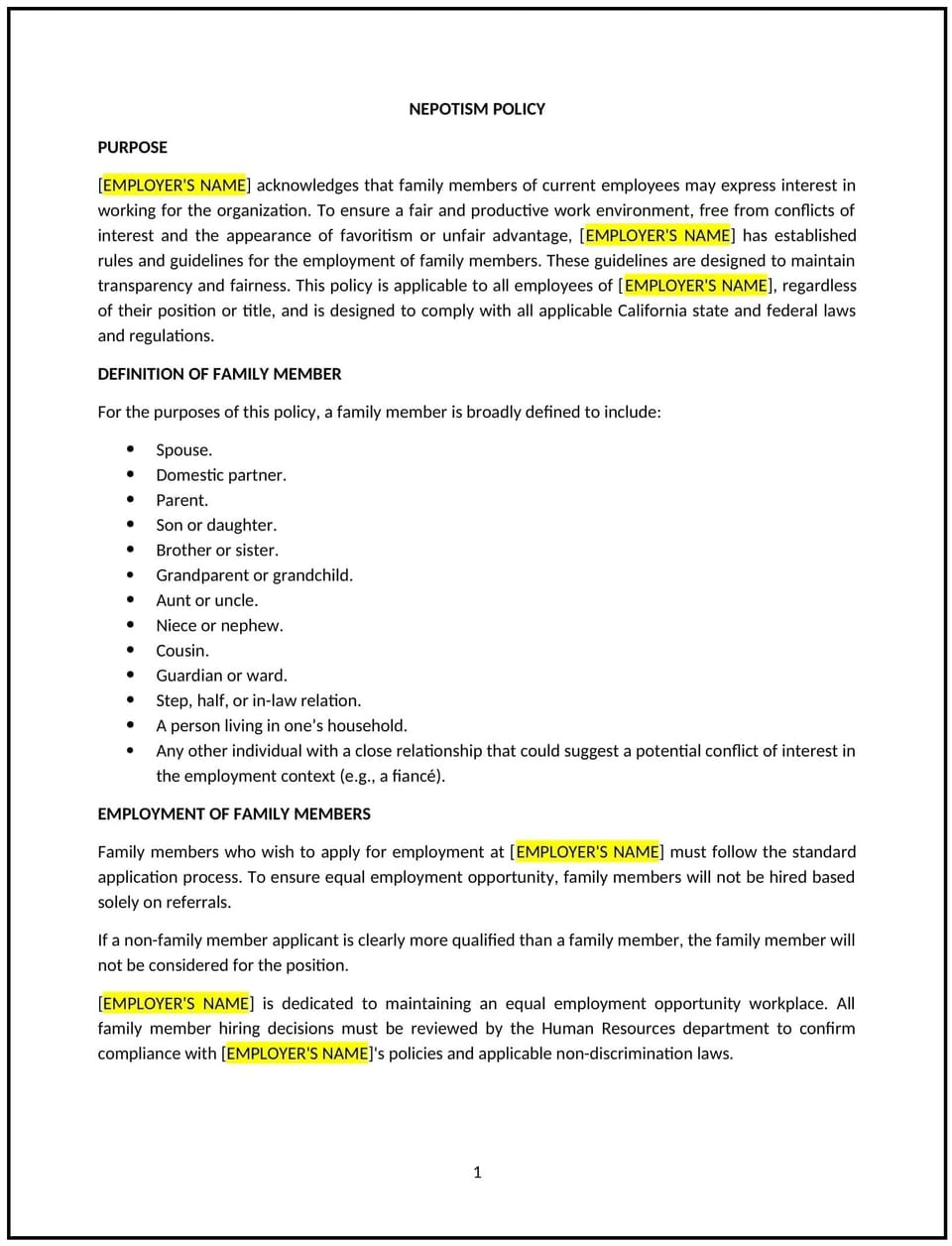Nepotism policy (California): Free template

Nepotism policy (California)
In California, a nepotism policy provides businesses with guidelines to prevent conflicts of interest, favoritism, or perceptions of unfair treatment related to employing family members or close relations. This policy supports compliance with California labor laws and promotes a fair and equitable workplace.
This policy outlines the business’s expectations regarding hiring, supervising, and evaluating employees with family or personal relationships. By implementing this policy, California businesses can reduce workplace conflicts, enhance transparency, and maintain trust among employees.
How to use this nepotism policy (California)
- Define nepotism: Clearly state what constitutes nepotism, including hiring, supervising, or favoring family members or individuals with close personal relationships.
- Establish restrictions: Prohibit direct reporting relationships or decision-making authority between related employees to prevent conflicts of interest.
- Require disclosure: Ask employees to disclose familial or close personal relationships with current employees or job applicants.
- Communicate decision-making standards: Ensure that hiring, promotions, and other employment decisions are based on merit and qualifications.
- Monitor compliance: Regularly review relationships and employment practices to maintain a fair and impartial workplace.
Benefits of using this nepotism policy (California)
This policy offers several advantages for California businesses:
- Supports compliance: Aligns with California labor laws prohibiting favoritism and discrimination in employment practices.
- Promotes fairness: Ensures employment decisions are based on merit, creating a level playing field for all employees.
- Reduces conflicts: Minimizes workplace tensions and perceptions of bias arising from personal relationships.
- Enhances transparency: Demonstrates the business’s commitment to impartial and ethical practices.
- Encourages accountability: Clarifies expectations for employees and managers regarding personal relationships in the workplace.
Tips for using this nepotism policy (California)
- Reflect California-specific laws: Ensure the policy aligns with state labor regulations and anti-discrimination requirements.
- Train managers: Provide guidance on handling situations involving related employees to ensure consistency and fairness.
- Encourage disclosure: Create a culture where employees feel comfortable disclosing relationships without fear of retaliation.
- Review employment practices: Regularly assess hiring, promotions, and evaluations to ensure they are merit-based and impartial.
- Update regularly: Revise the policy as needed to reflect changes in California laws or workplace dynamics.
Q: How does this policy benefit the business?
A: This policy supports compliance with California labor laws, promotes fairness, and reduces workplace conflicts related to personal relationships.
Q: What types of relationships are covered under this policy?
A: The policy applies to familial relationships, such as spouses, siblings, parents, children, and other close personal relationships that may create conflicts of interest.
Q: How does this policy support compliance with California laws?
A: The policy aligns with California labor regulations to ensure that employment practices are fair and non-discriminatory.
Q: What steps should employees take to disclose a relationship?
A: Employees should notify HR or their manager and provide details of the relationship to assess any potential conflicts of interest.
Q: How can the business address conflicts of interest related to nepotism?
A: The business can reassign duties, restructure reporting lines, or implement other measures to ensure fairness and impartiality.
This article contains general legal information and does not contain legal advice. Cobrief is not a law firm or a substitute for an attorney or law firm. The law is complex and changes often. For legal advice, please ask a lawyer.


